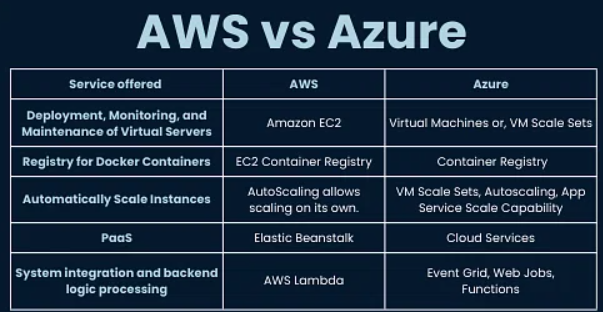AWS Vs. Azure Comparison: Choosing the Right Cloud Platform
In today’s rapidly evolving technological landscape, cloud computing has transformed into an essential foundation for various industries. The convenience of relying on cloud platforms for application hosting, data storage, and operational streamlining has captured the attention of businesses and individuals alike. Among the leading contenders in the cloud computing arena, two names stand tall: AWS (Amazon Web Services) and Azure (Microsoft Azure). This comprehensive article undertakes a rigorous in-depth comparison between AWS and Azure, providing you with the necessary insights to navigate the complexities and decide which cloud platform aligns optimally with your specific requirements.
Table of Contents

AWS vs Azure
AWS vs Azure: Which Cloud Platform Is Right for You? An In-depth Comparison
In the era of surging demand for cloud services, the decision-making process between AWS and Azure holds substantial weight. In this section, we dissect the multifaceted dimensions of these platforms to assist you in making an educated selection in alignment with your business or personal needs.
Cost and Pricing Models:
When embarking on the journey of evaluating cloud platforms, cost emerges as a pivotal factor. AWS and Azure present distinctive pricing models that necessitate a thorough understanding of your resource consumption patterns and financial boundaries.
AWS: Amazon Web Services introduces the pay-as-you-go model, a paradigm that empowers users to pay solely for the resources they actually use, all without being encumbered by upfront costs. This level of flexibility proves particularly beneficial for nascent startups and small enterprises, eliminating unnecessary expenses tied to underutilized resources.
Azure: Azure follows suit with a comparable pricing strategy grounded in pay-as-you-go flexibility. Microsoft extends its offerings by presenting an array of subscription plans, thoughtfully tailored to diverse user needs. For enterprises seeking long-term stability, Azure introduces the concept of reserved instances, allowing upfront commitments in exchange for long-term cost savings.
Services and Offerings:
Both AWS and Azure boast sprawling portfolios of services, catering to a wide spectrum of technical demands. Here, we delve into the expansive selection of offerings each platform presents.
AWS: Amazon’s cloud platform unfolds as a treasure trove encompassing a plethora of services spanning across computing, storage, databases, analytics, networking, and machine learning domains. Standout services within the ecosystem include the likes of EC2 for harnessing scalable computing power and S3 as a reliable object storage solution.
Azure: Microsoft’s Azure mirrors its rival’s depth, introducing a suite of services spanning computing, analytics, databases, networking, and the IoT (Internet of Things). Noteworthy services within this constellation include Azure Virtual Machines for adaptable performance levels and dependable Azure Blob Storage.
Performance and Reliability:
In an environment where sustained uptime and optimal performance are non-negotiable, the evaluation of a cloud platform’s reliability attains paramount importance.
AWS: Global data centers forming the backbone of AWS’s infrastructure ensure not only high availability but also impressively low latency. Also, this reliability is fortified by a Service Level Agreement (SLA) that vouchsafes 99.99% uptime for all services, thereby providing a dependable performance foundation for businesses across the spectrum.
Azure: The extensive network of data centers underpinning Azure contributes significantly to its reliability. Also, Azure’s SLA reflects a commitment akin to AWS, promising 99.99% uptime. Furthermore, Azure Virtual Machines emerge as versatile tools, offering customizable performance levels based on specific requirements.
Scalability:
A hallmark of cloud computing lies in its inherent capacity for seamless resource scaling. Here, we scrutinize how AWS and Azure fare in this crucial dimension.
AWS: Amazon’s AWS introduces Auto Scaling, an intelligent feature that seamlessly adjusts resource allocation in response to varying levels of traffic. This dynamic allocation ensures that applications operate optimally even during unexpected spikes in usage.
Azure: Azure’s Auto Scaling functionality operates in a similar vein, adapting resources on the fly to match real-time demand. Particularly appealing for businesses heavily invested in Microsoft’s ecosystem, this feature dovetails seamlessly with other Microsoft tools, rendering the entire experience coherent and streamlined.
Security:
Security assumes paramount significance as organizations consider the prospect of entrusting their data and applications to cloud platforms.
AWS: Amazon Web Services stakes its claim in the realm of security with robust features including Identity and Access Management (IAM), a tool granting fine-grained control over user access. The breadth of AWS’s compliance certifications renders it especially appealing to sectors necessitating stringent security protocols.
Azure: Matching AWS stride for stride, Azure bolsters its security prowess through features like the Azure Active Directory and meticulously devised role-based access controls. Furthermore, Azure’s array of compliance certifications positions it as a formidable choice for businesses operating within heavily regulated sectors.
FAQs:
Q: Which pays more, AWS or Azure?
The pay scales for roles involving AWS (Amazon Web Services) and Azure (Microsoft Azure) can vary depending on factors such as job role, experience, location, and specific skills. Both platforms are in high demand, and professionals with expertise in either can command competitive salaries.
Q: Who gets paid more, Azure or AWS?
The earning potential between Azure and AWS roles can be similar, as it’s often driven by individual skills, certifications, and job responsibilities rather than the platform itself.
Q: What are the top Azure certifications in 2023?
As of 2023, some of the top Azure certifications include the Azure Solutions Architect Expert, Azure DevOps Engineer Expert, and Azure AI Engineer Associate, among others. These certifications validate advanced skills in specific Azure domains.
Q: Should I learn AWS or Azure in 2023?
The decision between AWS and Azure depends on your career goals, the job market in your region, and the type of projects you’re interested in. Both platforms offer valuable skills, so researching job opportunities and considering your interests can help guide your choice.
Q: Which Azure certification is easy to complete?
How fast can you get Azure certification? Entry-level certifications like AZ-900 (Microsoft Azure Fundamentals) are generally considered more accessible. Also, the time it takes to get an Azure certification varies based on your familiarity with the platform and the time you can dedicate to studying.
Q: Can Azure certification get you a job? Can I get a job with Azure 900 certification?
Azure certifications can certainly enhance your job prospects, especially for roles related to cloud computing, architecture, and administration. While an AZ-900 certification introduces foundational concepts, higher-level certifications often provide more comprehensive skill validation.
Q: Is Azure 900 certification worth it? Is Azure certification enough to get a job?
The AZ-900 certification is a worthwhile starting point for those new to Azure, as it establishes a foundational understanding. However, higher-level certifications may be more impactful when seeking specific job roles.
Q: How long should you study for Azure certifications?
The required study time for Azure certifications varies depending on your existing knowledge, the certification level, and the complexity of the material. Some certifications might require a few weeks of focused study, while others might take several months of preparation.
Q: Is it worth getting Azure certified?
Azure certifications can significantly enhance your skillset and employability in the growing field of cloud computing. Also, they can open doors to various job opportunities and demonstrate your expertise to employers.
Q: How hard is the Azure exam? Does Azure certification require coding?
The difficulty of Azure exams varies based on the certification level and your familiarity with the subject matter. Also, some exams may require hands-on lab exercises or coding tasks, but the extent of coding varies depending on the certification focus.
Conclusion:
In the arena of cloud platforms, the leaders AWS and Azure stand tall, each accompanied by its array of strengths and features. The decision-making process centers on a nuanced evaluation of your individual needs, budgetary considerations, and the prevailing technological milieu. Also, scrutinizing factors like cost, service diversity, performance, scalability, and security empowers you to confidently discern whether AWS or Azure aligns with your cloud platform requisites.
Remember, both AWS and Azure provide the avenue of free tiers or trials, facilitating hands-on exploration of their capabilities. Approach your cloud journey armed with insights and a crystalline comprehension of your prerequisites. Whether your journey begins as a startup, a burgeoning enterprise, or an established entity, the ideal cloud platform awaits to fuel your digital aspirations forward.
Hello, I’m Cansu, a professional dedicated to creating Excel tutorials, specifically catering to the needs of B2B professionals. With a passion for data analysis and a deep understanding of Microsoft Excel, I have built a reputation for providing comprehensive and user-friendly tutorials that empower businesses to harness the full potential of this powerful software.
I have always been fascinated by the intricate world of numbers and the ability of Excel to transform raw data into meaningful insights. Throughout my career, I have honed my data manipulation, visualization, and automation skills, enabling me to streamline complex processes and drive efficiency in various industries.
As a B2B specialist, I recognize the unique challenges that professionals face when managing and analyzing large volumes of data. With this understanding, I create tutorials tailored to businesses’ specific needs, offering practical solutions to enhance productivity, improve decision-making, and optimize workflows.
My tutorials cover various topics, including advanced formulas and functions, data modeling, pivot tables, macros, and data visualization techniques. I strive to explain complex concepts in a clear and accessible manner, ensuring that even those with limited Excel experience can grasp the concepts and apply them effectively in their work.
In addition to my tutorial work, I actively engage with the Excel community through workshops, webinars, and online forums. I believe in the power of knowledge sharing and collaborative learning, and I am committed to helping professionals unlock their full potential by mastering Excel.
With a strong track record of success and a growing community of satisfied learners, I continue to expand my repertoire of Excel tutorials, keeping up with the latest advancements and features in the software. I aim to empower businesses with the skills and tools they need to thrive in today’s data-driven world.
Suppose you are a B2B professional looking to enhance your Excel skills or a business seeking to improve data management practices. In that case, I invite you to join me on this journey of exploration and mastery. Let’s unlock the true potential of Excel together!
https://www.linkedin.com/in/cansuaydinim/









